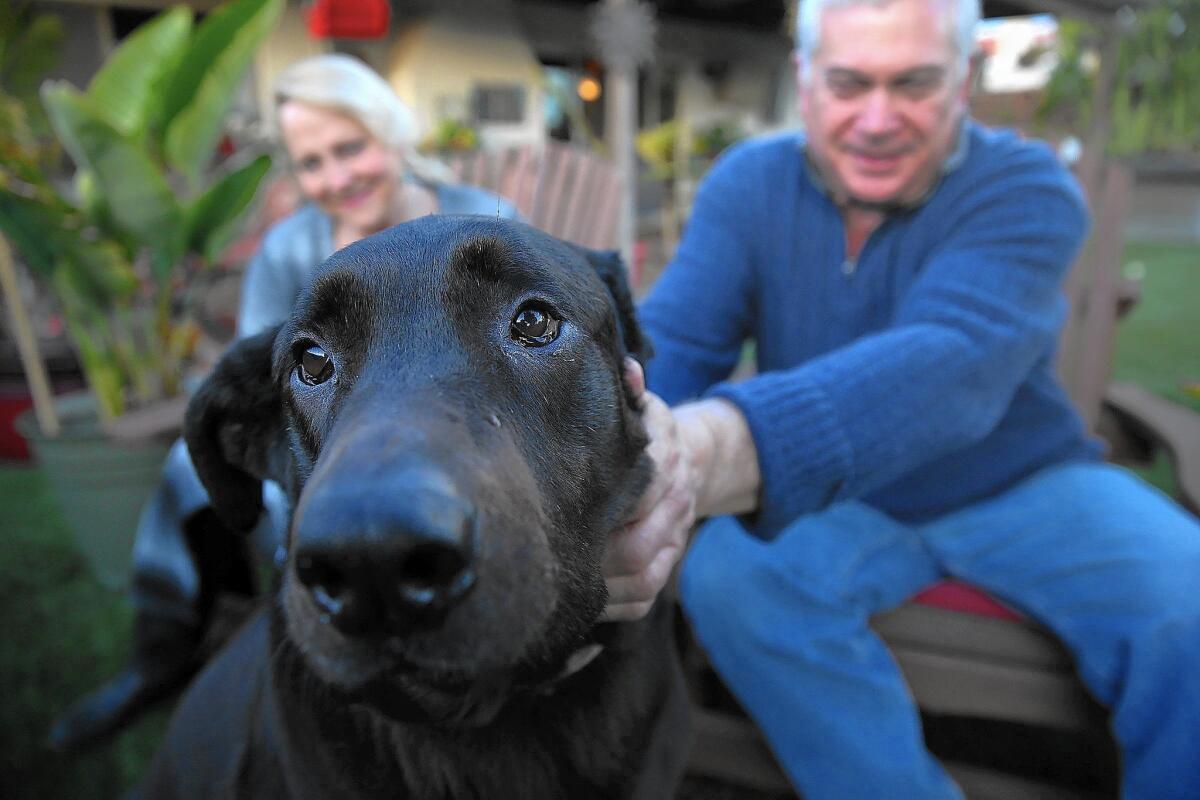Porter Ranch gas leak is affecting animals too, pet owners fear

Amy and Maury Masliah and Clyde, their lab and Australian Ridgeback mix, live four miles from the leak site. Clyde’s sister died recently of a lung tumor.
- Share via
As she visited her American quarter horse at stables just east of Porter Ranch, Debra Zavatto came across a frightening sight: blood coming out of the animal’s nose.
In the 13 years she’s cared for Scarlett, Zavatto had never seen anything like that.
“People were saying, ‘Oh, this stuff is giving nosebleeds,’” she said of the natural gas leak that has sickened residents of Porter Ranch. “I thought, ‘Oh my God, I wonder if my horse got a nosebleed from the gas.’”
The experience is not unique. In Porter Ranch and the nearby communities of Chatsworth and Granada Hills, animal owners are seeing unexplained ailments and behaviors in their pets. Many are questioning whether the methane and odorants escaping from the leak in nearby Aliso Canyon may be to blame.
See more of our top stories on Facebook >>
Southern California Gas Co. first reported the leaking well Oct. 23, and since then an estimated 77 million kilograms of methane have been released, leaving communities near the site to deal with foul odors and nosebleeds, headaches, nausea and other short-term ailments.
Of the 2,479 households that have relocated out of Porter Ranch, 40% have pets, primarily cats and dogs, gas company spokeswoman Anne Silva said. The gas company is not keeping data on how many customers say their pets have fallen ill or died as a result of the gas leak.
Odorants in the methane may cause the health problems people are experiencing, health officials say. But what effect they may have on animals remains unclear.
Veterinary experts cautioned that pet owners should reserve judgment, for now.
“Even though you smell it doesn’t mean it’s at a high enough level to cause problems,” said Robert Poppenga, a professor of veterinary toxicology at the UC Davis School of Veterinary Medicine. “The problem is if you’re talking about dogs or cats or cattle or horses, there’s very little information of toxicity specific to the species.”
But absent any hard facts, pet owners who see their animals in distress or discomfort are left to draw their own conclusions. They might not be certain the fumes are causing illnesses, but neither can they know the emissions are not responsible.
Four miles away from the natural gas storage wells, Amy Masliah is mourning the death of Bonnie, a 7-year-old lab and Australian Ridgeback mix. Seven weeks ago, doctors discovered a lung tumor in the dog and gave her weeks to live. Masliah believes her dog’s tumor was the result of the methane, odorants and benzene in the air.
“She died a very horrible, painful death,” Masliah said. “She couldn’t breathe. We had to put her to sleep.”
Now Masliah is worried about Bonnie’s brother, Clyde, who is coughing and developing excessive mucus in his nose and eyes.
Problems are also occurring with pets whose families have temporarily relocated out of Porter Ranch. Southern California Gas moved Daysi Ibanez and her family out of Porter Ranch Estates and into a property that would not accept dogs. The family sent their 6-year-old Yorkie, Chase, to a pet hotel. It was there that the 5-pound dog started to lose weight, Ibanez said.
Ibanez had planned to breed Chase, but when she saw how poorly he was adapting to his new surroundings, she made the decision to neuter him and place him in a doggy day care program.
“We were afraid he was going to die from sadness,” she said. “I can’t even imagine if he died. I feel like heads would roll.”
Though the Los Angeles County Department of Public Health’s veterinary team acknowledges that little is known about the effects of methane and odorants on animals, officials warned residents to keep their pets indoors and to contact a vet if their pets are lethargic, vomiting or having difficulty breathing.
“The only advice in those situations is probably to consult with their regular veterinarian and have the veterinarian go through in a systematic way all of the possibilities for a respiratory problem and try to eliminate the things that can be tested for,” UC Davis’ Poppenga said.
NEWSLETTER: Get essential California headlines delivered daily >>
Veterinary experts with the county plan to examine dead birds from the community. The department’s veterinary staff is also surveying animal hospitals in the area to see if there’s been an increase in animals with symptoms that could be related to the leak, according to the department’s Dr. Cyrus Rangan.
Neither the state Office of Emergency Services nor the Los Angeles Emergency Management Department have received reports of sick or dying pets.
That goes for wild animals too.
State Department of Fish and Wildlife wardens say they have not seen any coyotes, birds, squirrels or other animals fall ill because of the methane exposure. In fact, wild animals may have left the area because of the noise coming from crews attempting to fix the well, agency spokeswoman Mary Fricke said.
Back at Hillcrest Ranch stables, Zavatto still wonders about what happened to Scarlett. She says the other horses at the ranch haven’t exhibited any symptoms.
“I don’t think I’ve ever smelled the gas over there, but it is possible that at certain times of the day the gas does drift over there,” she said, trying to understand what would cause a horse to suddenly develop a nosebleed.
ALSO
As Porter Ranch gas leak lingers, candidates smell a political opportunity
Explosion risk stalls plan to capture and burn gas from Porter Ranch leak
Benzene risk from Porter Ranch gas leak is the same as rest of region, study finds
More to Read
Sign up for Essential California
The most important California stories and recommendations in your inbox every morning.
You may occasionally receive promotional content from the Los Angeles Times.











